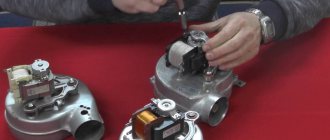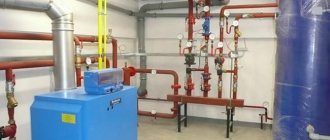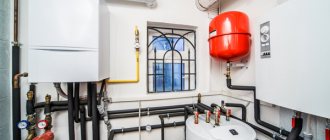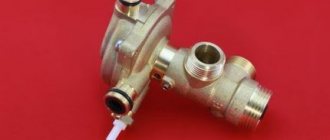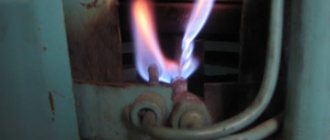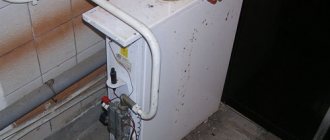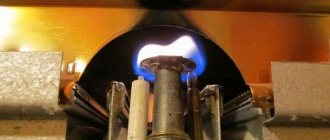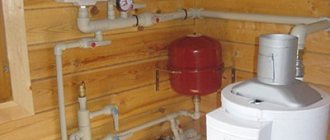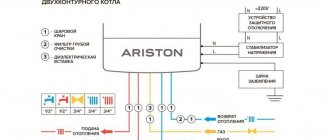In order for the heating system to work efficiently and to avoid breakdowns, it is necessary to maintain and check all elements of the system. Breakdowns can happen in different ways and for different reasons. Very often you hear extraneous noise in the system. There is also a sound in a gas boiler, similar to a whistle. But under no circumstances should such a problem be ignored. Since other malfunctions may occur, and, consequently, deterioration in the performance of the boiler. Or the heating device will stop working altogether. A whistling sound in a gas boiler may indicate one or more problems. They need to be found and eliminated. If this is not done, then an emergency situation will occur. You can look for the cause of the whistling yourself or trust qualified specialists. In our article we will look at the possible causes of whistling in a gas boiler.
What causes noise in the boiler?
Extraneous noise in a boiler is most often not as dangerous as it might seem to the average person. The only threat is the appearance of malfunctions when the boiler requires major repairs or replacement. Do not put off checking the heating system for a long time if extraneous sounds appear in the gas burner. You should immediately contact a specialist who can determine the cause of the noise and eliminate it. It is not recommended to disassemble the boiler yourself if you are not sure of how it functions and what parts it consists of.
Most often, the causes of humming, tapping, hissing and other noise accompanying the operation of a gas boiler are:
- operation of non-freezing media
- reduction in gas pressure
- scale on boiler parts
- malfunction of circulation pumps
- incorrect burner installation
- fan malfunction
Scale formation
A high salt content in water leads to scale deposits on the walls of the device. When heated, the salts will make themselves known by hissing. Because of this, the device heats up much more slowly. The radiator needs to be cleaned once a year. To do this, you will need a reagent, a special pump through which the reagent is poured into the device and rinses it from the inside.
Scale in the boiler - how to deal with it
In radiators, water does not move as quickly as in pipes, and the sedimentation of suspended matter is many times higher. Regular cleaning of radiators is necessary. You can flush the entire system at once or separately the radiators using a compressor unit. To flush, the radiator is connected to the compressor, and dirt is cleaned from it with water pressure.
Sometimes it is enough to simply flush the system with strong water pressure. Chemical reagents are used in cases where the situation with scale deposits is extremely advanced.
Scale formation deforms the device
Under the influence of chemicals, cracks may form in radiators that were clogged with salts. In order to prevent an emergency, before starting the system, all equipment must be checked for readiness for operation.
Infrared heating panels
Why is a gas boiler humming - reasons and solutions
Users, as a rule, prefer silent gas boilers. If the unit is in good working order, it should not produce too loud noises. But it happens that the boiler makes an uncharacteristic hum. Then the question arises, why is the gas boiler humming? If it is new, then in most cases there are no problems here, just some new elements expand and contract under the influence of temperature changes. It takes time for them to get into working shape and fall into place.
The most common reasons why a gas boiler hums loudly are:
- fan malfunction;
- a large amount of oxygen in the coolant;
- sediment on parts;
- reduction in gas pressure.
Sometimes the reason why a double-circuit gas boiler hums is a malfunction of the fan. This is caused by a lack of lubrication and contamination of the blades. In this case, it is necessary to clean the fan and lubricate the bearing with oil. If necessary, the broken part is replaced with a new one.
The hum of a gas boiler can be monotonous or periodic with crackling. Smooth noise occurs even with new units. In this case, boilers in which the coolant circulates naturally are usually noisy. The cause is an excessive amount of air in the coolant. The fact is that when heated, many air bubbles form in the water, which produce noise. This is the answer to a common question from consumers, why a gas boiler hums when heating. Such noise does not mean there is a problem with the gas unit, but it does cause some discomfort.
The problem can be solved by converting the system to a closed one. You can change the type of system by installing valves and replacing the expansion tank with a membrane one. It will also be useful to connect weather-sensitive automation. Such measures will help extend the life of the unit.
Another common reason why a gas boiler hums loudly is the accumulation of limescale deposits. When the coolant is heated to more than 60ºC, scale begins to actively develop, which over time clogs the heat exchanger pipes. In this case, the heat exchange between the circuit and the coolant deteriorates, and the efficiency of the unit is significantly reduced. Under the influence of circulating water, pieces of scale break off and move, while they hit the metal walls of the heat exchanger and create a knocking noise.
The problem is solved by cleaning the heat exchanger. However, flushing can only be done on regular circuits. If the bithermal heat exchanger becomes clogged, all you have to do is throw it away and buy a new one. In addition, such circuits become clogged faster than their classic separate counterparts.
After installing a cleaned heat exchanger in a gas boiler, it will stop making noise.
In some cases, noise in a gas boiler causes a decrease in gas pressure. Because of this, water circulation in the system decreases and air pockets appear. As a result, the unit overheats, trying to reach the required temperature, and begins to hum.
You can eliminate noise by solving the problem of low gas pressure. The reason for the decrease may be:
- low pressure in the line;
- gas pipeline contamination;
- presence of a leak (accompanied by a characteristic smell of gas);
- gas meter malfunction.
If the “root of the problem” is a leak or low pressure in the centralized main, then only representatives of the gas service can help.
If a gas pipeline is clogged, it needs to be cleaned. If a breakdown occurs in the gas meter, fuel will pass through it with difficulty. A symptom of a problem with the meter is noise and crackling noise coming from it. After replacing the measuring device with a new one, the pressure will return to normal and the noise will stop.
Note! It is necessary to know the optimal gas pressure readings and measure it periodically. The value should be within 1.5-2 atmospheres.
There are other reasons why a gas boiler hums or makes noise:
- The bypass or gas valve is not set correctly, resulting in a howling sound.
- If the power of a gas appliance exceeds what is required, this often results in vibration and rattling sounds.
- If there is a lack of coolant in the system, the gas boiler will also make vibration noise.
- If sounds of rattling metal appear, this may be due to installation errors of the unit.
Fan problems
The fan operates in models with a closed chamber and forced removal of combustion products. Why does it make strange sounds when rotating, whistling:
Fan malfunctions can often occur. Then, when rotating, it can cause various extraneous sounds. The cause may be insufficient lubrication. The lubricant tends to dry out quickly due to exposure to high temperatures. As a result, the bearings fail.
The accumulation of dirt and dust in the blades is another cause of squeaking. The fan needs to be removed and cleaned.
The accumulation of dirt and dust in the blades is another cause of squeaking. It is necessary to clean them to get rid of squeaking when rotating. The fan is used for the smoke exhaust function and also removes residual gas combustion products.
Why does the boiler hum when hot water is turned on?
Gas boiler repair specialists note that the occurrence of noise when heating water can be influenced by indirect or more serious reasons.
First, you need to study not the most serious breakdowns that will not be difficult to fix on your own.
Why is the gas boiler humming?
- Serious errors were made during installation or assembly of equipment. To fix the problem, you need to check all parts and connections. If you have no experience in plumbing, then it is advisable to call a specialist who did the installation. He will correct his shortcomings.
- A gas boiler, like any other equipment, must be correctly configured to operate under specific conditions. If the owner of the equipment made mistakes, then loud noises may appear when heating the water. The only way to fix the problem is to carefully read the instructions and re-make the necessary settings.
- The boiler may begin to hum due to old age. If the equipment was purchased many years ago, then some components are probably out of order. In this case, only replacement with new equipment will help.
These problems are rather vague. If the boiler starts to hum, then first you can check these three points, perhaps one of them will help fix the problem. Such operations can be carried out in a fairly short period of time. But if a gas heating boiler makes a lot of noise when heating water, then it is necessary to look for clearer and more serious reasons.
Boiler noise when heating water:
- One of the main reasons why a boiler hums when heating a liquid is the high concentration of oxygen in the water that passes through the pipes of the device. Because of this, when heated, a large number of bubbles can form in it. This effect produces not only a strong hum, but also noticeable vibrations. A clear sign of increased oxygen concentration is the hum of the gas boiler and the vibration of the batteries connected to it.
- A large amount of air has accumulated in the installed system. If you hear strong puffing and even knocking noises when heating the water, then it is necessary to remove the air from the pipes. Modern boilers are equipped with special taps; they must be opened to release air and eliminate the problem.
- Another common problem that causes a loud humming sound when heating water is the accumulation of salts that are deposited in the heat exchanger. To fix the problem, you will need to open the gas boiler. If its walls are covered with salts, then you were able to find the cause of the buzzing. Due to the accumulation of salts, the equipment begins to work very loudly when heating the water. Thorough cleaning and rinsing of the heat exchanger walls is necessary. It is important to note that thermal output and heating dynamics may also be affected. Initially, the hum will come from the heat exchanger, which is located in the gas boiler.
To avoid difficulties, it is necessary to check and, if necessary, clean the radiator at least once a year. For these purposes, it is advisable to purchase a pump from a specialized store (otherwise the heat exchanger will not have enough water for cleaning), which has a reagent. The cleaning liquid will be supplied to the gas equipment through hoses.
The fan is quite easy to dismantle.
The fan is usually connected to a special compartment through which combustion products are eliminated. If the fan becomes clogged, the boiler starts to operate very noisily. You can even hear a whistle.
There are several reasons for fan failure:
- First you need to check the condition of the bearings. They should be located directly above the burner. It is possible that the lubricant that should be poured inside has evaporated or leaked. In this case, it is necessary to disassemble the device and lubricate the parts. It is important to read the instructions before doing this and find out which lubricant is suitable for the equipment model you are using.
- If the problem is not resolved by replacing the lubricant, you will have to check the balancing of the blades. Since a large amount of combustion products exits through the pipes, a large amount of dirt can stick to the blades. As a result, when rotating, they will begin to work very loudly and create an unpleasant hum. To restore the fan's performance, it is necessary to thoroughly clean the blades, and then correctly adjust their rotation through balancing.
If none of the above methods helps fix the problem, you need to check the pump in the boiler, which can make a lot of noise when the pressure in the system changes. In this situation, you will have to configure it again. If too much pressure builds up in the pump, the first sign of this is the appearance of a humming sound.
It is not difficult to replace a broken pump
In the future, this can lead to an emergency situation that is dangerous to human life. To change the equipment settings, you need to move the white lever on the box where the terminals are located to a different position. As a rule, the problem disappears.
The correct setting is necessary for the boiler to operate without extraneous noise when heating water. If the device overheats greatly, this can lead to the problem in question.
The main reason is the lack of water in the network. In this case, you will need to study the operation of the thermostat and its parameters. Perhaps its settings have gone wrong. You will have to set more appropriate parameters yourself. It is also advisable to measure the pressure inside the system. If there is a need for this, add a coolant inside the device.
You can also regulate the gas valve or bypass on a gas boiler, which is also called a jumper. If a humming noise starts when the water heats up, then these parts need to be adjusted.
If clicking or popping noises are observed during startup, you need to check the following parts:
- Three-way valve. This is a switch from hot water to heating. If clicks are observed during operation, the valve must be replaced.
- The spark takes a long time to fire. If the burner is unstable, a spark may not appear immediately. This will cause a gas build-up to form. As soon as ignition occurs, it will flare up and you can hear popping sounds. To fix the problem, you will need to check the burner and igniter, as well as all contacts.
- The chimney or filter is clogged with dirt. The solution is thorough cleaning. The chimney is checked with a lit match. It must be brought close to the ventilation; if the flame sways, then the system is working properly.
By checking these parts, replacing them or cleaning them, the boiler will stop making clicking noises every time it ignites.
A gas boiler is a necessary thing in a private home. Therefore, when purchasing, it is necessary to carefully study the instructions for it in order to find out about the existing parts of the device that may have to be repaired.
If you properly care for and timely adjust the equipment and clean certain parts, then you can reduce the likelihood of extraneous noise appearing in the boiler when heating water. The device will operate normally.
Sometimes insufficiently purified water enters the heating network - the filters simply cannot cope with the cleaning. Because of this, when heated, a sediment appears, and with it scale, the volume of which only increases over time. The device begins to work worse and make characteristic whistling sounds.
In this case, attention should be paid to the heat exchanger. Directing heat to the coolant, it begins to whistle. This indicates that there is already quite a lot of scale. If it is not eliminated, then characteristic tapping sounds may be added to the whistle.
In such a situation, it is necessary to thoroughly clean the heating system. To do this, you need to contact a specialist. Normal cleaning is only possible using a special pump and special chemicals that remove scale and other deposits. As a rule, the boiler stops making noise after this procedure. If the noise remains, then the reason is different.
Important! We recommend cleaning the heating system at least once a year.
Another reason why a gas boiler whistles lies in the coolant itself. Or rather, oxygen can get into it. The coolant heats up, oxygen is released in small bubbles. Because of this, a sound appears that resembles a boiling kettle. At times it can be quite loud, causing discomfort to residents.
To avoid such noise, the heating system must be well insulated. There are several ways to do this:
- install a membrane tank;
- install air vents;
- equip the automation with sensors that react to weather changes;
- introduce automatic make-up into the heating structure.
Each of these methods not only helps eliminate noise, but generally increases the efficiency of heating equipment. But it is not recommended to do such work yourself. It is better to entrust it to a qualified technician.
The task of the fan is to remove combustion products from the apparatus, to blow through the system and remove smoke. A whistling sound during operation may indicate a malfunction. In new boilers, such a breakdown is very rare. But if you have been using the boiler for several years, it is quite possible.
The problem often occurs if the fan is located above the burner or there is no lubrication. Gradually it dries out, which causes rapid wear of the bearings. This can be solved by simply disassembling the fan and lubricating the parts.
Sometimes a whistle can indicate that the blades are unbalanced. There are many reasons for this phenomenon, but the main one is the accumulation of dust and dirt. The solution is cleaning. In some cases, it is easier to replace the fan with a new one. This is a relatively inexpensive part of the system, but to replace it, it is also better to contact a specialist.
Sometimes whistling and hissing are caused by low pressure or lack of coolant in the system. The latter factor leads to overheating of the boiler and noise. In addition, the following may occur:
- the boiler was initially installed and connected incorrectly;
- the equipment was configured incorrectly;
- the components are already worn out after long-term use;
- excessive pressure from the pump;
- lack of water in the system;
- incorrect valve setting;
- valve is damaged.
In some cases, noise may occur not only during operation of the equipment, but also when turned on.
How to avoid knocking
When the reason why the heating boiler is knocking has been identified and the equipment has undergone the necessary maintenance, the owner’s main task is to prevent the emergency from occurring again. To do this, it is enough to carry out preventive maintenance before each heating season, when the installation is not in active mode. This work consists of several simple procedures:
- Once a year, it is necessary to remove the cover of the unit housing and clean the main elements from dust and other contaminants. The best option would be to purchase a portable compressor and clean the parts with a compressed air gun.
- If regular blowing does not help, the boiler can be flushed under high water pressure when it is turned off. Before starting operation, all parts must be dry, so this work is best done in the summer.
- If pipes, fittings, pipes, valves or taps become overgrown with rust, it must be removed. This problem is possible not only when corrosion occurs, but also when there is a high content of iron oxides in running water from a well. Deferrization of a liquid medium is carried out by introducing into the coolant composition special chemicals that are widely available for sale.
- At the inlet of clean water from the well to the rear, a reverse osmosis system with replaceable filter cassettes should be installed. This will help clean the liquid medium from foreign impurities and significantly soften the composition of the water.
The best solution for the prevention of boiler equipment would be to conclude an operating agreement with a specialized organization. According to a pre-agreed schedule, professionals will not only carry out routine maintenance and cleaning of the installation, but will also identify minor deficiencies and correct them in advance.
The video contains more information about the prevention of gas boiler installations
Popping and clicking noises when igniting
When starting an Ariston or another brand of boiler, do you hear knocking and popping noises? The problem requires an immediate solution.
Three-way valve
The part is used to switch the operation of the unit from heating hot water supply (DHW) to heating, and vice versa. A faulty valve will click every time it is ignited. In this case, it needs replacement.
Ignition block
A loud bang occurs when the spark ignites for a long time. Then a lot of gas accumulates, which flares up when ignited. It is necessary to carry out diagnostics of the unit: burner, igniter, electrode, contacts and connections.
Wick clogged
When ignited, the product bangs, which indicates a clogged wick or chimney. The problem is typical for semi-automatic models. Inspect the wick: if clogged, clean it.
To make sure that the chimney shaft is clogged, check for draft:
- Place a lit match near an inspection window or vent.
- If the flame deviates to the side, the draft is normal; if it burns evenly, it needs cleaning.
For your part, you can clean out the mine. But to completely remove contaminants, it is better to contact utility services.
In models with automatic ignition, the electrode may become clogged. Clean the part and install it 3-4 mm from the burner.
The injectors are clogged
When heating, a noise is heard, ignition does not occur, or the flame bursts out in jerks. Turn off the gas supply and clean the holes with a thin wire.
Incorrect installation
If the calculation and mounting of the device body is incorrect, the sounds of metal impacts appear. When the cladding heats up, the metal expands, and when it cools, it returns to its previous position, which leads to extraneous sounds.
The same thing happens with pipes that are walled into walls. When you turn on the heating and start hot water, the pipes expand slightly, which leads to knocking. When installing pipes into walls, it is necessary to leave a gap for thermal expansion.
Heat exchanger plates clogged
Then the boiler explodes when heated. And the plates can become clogged with dust, soot and soot. Remove the housing and clean the parts with a wire brush or a special vacuum cleaner.
The mesh located at the bottom of the case could become clogged with dust. In technology with an open combustion chamber, this leads to a decrease in thrust. Don't forget to clean.
Incorrect operation of the circulation pump
As a result of uneven operation, resonance occurs in the system, which leads to extraneous noise. Adjust pump settings.
Before starting any work, close the gas valve.
Important! If you smell gas, turn off the tap and call the gas service.
To reduce vibration, place a gasket under the housing. Regularly maintain the unit and clean parts from scale and dirt. This will allow you to operate the boiler safely and for a long time.
Prevention measures
If the boiler hums when starting up or turning on hot water, you must first make sure that there is a sufficient level of liquid in the system and, if necessary, top it up. If sounds are coming from radiators and pipelines, it means that air pockets have formed in them, which should be removed. If the pump knocks or whistles, it is most likely a manufacturing defect: you will have to install a new working unit.
An effective preventive measure is timely removal of scale from the heat exchanger. It is also important to monitor the gas supply so that the pressure does not build up too high.
Reasons for whistling in a gas boiler by model
Different boiler models are subject to specific breakdowns. Let's look at some of the models and the common faults that occur in them.
- NAVIEN. A common problem with these models is a weak pump. It can be solved by purchasing and installing a special stabilizer. Another cause of noise is clogged parts. Requires cleaning.
- Mimax. There may not be enough water pumped by the pump. Or lack of indoor air. In the latter case, it is enough to open the window while the boiler is operating and the problem will go away.
- Baxi. There may be three reasons: the gas valve is incorrectly adjusted, incorrect gas pressure (the norm is 13 mbar), or blockages in the gas reducer/burner.
- AOGV. Resonances may occur in the burner or the fan may not work properly. Sometimes the problem is solved by cleaning the solenoid valve and lubricating the part.
How to remove an air lock with your own hands
Air in the system after a long stop is common. This problem arises not only in the private sector, but also in apartment buildings. It's quite easy to solve.
Heating radiators are equipped with Mayevsky taps located at the ends of the radiators. This could be a valve or a fitting with a notch for a screwdriver.
How to fix:
- armed with a small container (for draining water), you need to unscrew the tap and let out the air;
- Actions should be performed carefully so as not to get burned by the escaping steam;
- when water comes out of the hole, close the valve;
- Such manipulations are carried out on each battery.
This eliminates noise and allows the coolant to move freely through the system, evenly releasing heat.
Heat carrier saturation
A very common occurrence is the ingress of oxygen into the coolant. Because of this, various extraneous noises may appear. Oxygen enters an open heating system more often than a closed one. When oxygen enters the system, it heats up and is released in the form of small bubbles. This creates a certain sound. It is somewhat similar to the sound of a kettle boiling. But such a sound does not mean that there is any malfunction in the system. It’s just that such a sound leads to discomfort for residents. After all, everyone wants to relax in silence, and not listen to extraneous sounds of operating equipment.
If the whistle appears due to oxygen getting into the coolant, then this will not affect the operation of the heating system in any way. But all the same, such noise must be eliminated. Although such a sound will not cause any harm to the system, it still makes you worry and think about the appearance of various problems.
In order to avoid oxygen getting into the coolant, it is necessary to arrange a closed heating system. But this is not so easy to do and will also require a lot of investment. Let's consider several options for how to install a closed heating system:
Examination
The draft sensor is changed in case of serious malfunctions in the operation of the boiler. Example:
- there are no significant problems in the chimney, and the device constantly turns off,
- the sensor works, and after 20-30 minutes it turns off,
- the boiler turns on only when the sensor has completely cooled down.
Therefore, regular sensor checks are necessary. There are the following methods for this:
- Attach a mirror to the sensor mounting site. It should not sweat when the boiler is operating.
- The chimney is partially covered with a damper. If there are no failures, the device turns off immediately.
- If the boiler has two circuits, it is transferred only to DHW mode. The tap opens completely. If the controller turns off, it means the traction sensor is not working well.
Problems
It happens that the alarm on a gas boiler starts beeping and cuts off the gas supply. Then the device turns off. However, there are no tangible reasons for this. For example, there is no smell of gas, smoke, excessive heating of equipment, etc. Often in these cases, users immediately turn off the sensor. In fact, this is a rather hasty decision. The reasons for this are:
- If a gas boiler beeps during operation, this may indicate weak draft. Flue gases do not move intensively. The boiler draft overturns. And large volumes of dangerous fumes can enter the home.
- Problems with reverse thrust. An air barrier is formed. The escaping gases go to a certain point in the chimney and return back. The reason for this is the weak heating of the pipe and modest thermal insulation.
With the sensor disabled, the user is left without protection in an emergency.
Trigger cases
Why does a gas boiler beep? This is an active control system. Signals can be caused due to failures in the mechanism and for objective reasons. Taking these factors into account, the triggering cases are as follows:
- Problems with the smoke elimination system.
- The parameters of the sensor itself have failed.
- Powerful wind. It is capable of extinguishing a gas burner. To prevent squeaking, you need a special stabilizer. And it is mounted on the outlet pipe section.
- The chimney is clogged. It needs to be cleaned thoroughly.
- Already identified dilemmas with traction.
- The boiler is not installed correctly.
- The chimney parameters are incorrectly calculated. His correct position is strictly in the middle of the roof. The head exceeds the ridge by at least 50 cm.
Clogged heat exchanger
The water that enters the heating system is not pre-purified or filtered, so when it is heated, sediment forms. Over time, it forms scale on working parts, which reduces the performance of devices and causes extraneous noise.
The heat exchanger is one of the most important functional elements. It heats up as a result of gas combustion and transfers heat to the coolant. The whistle does not appear immediately, but only some time after the start of the equipment’s operational period. Lime deposits affect the service life of the boiler, significantly reducing it.
Note!
With heavy deposits, not only extraneous whistles appear, but also a characteristic knocking sound, which indicates that the system needs to be cleaned of scale.
There is only one way to solve the problem of why a single-circuit gas boiler whistles if it is caused by the formation of lime deposits. This is cleaning the heating system. This can be done using special chemicals that are sold in household chemical stores.
prokommunikacii.ru
Sensor Consideration
Any modern boiler has a special indicator - this is a gas boiler draft sensor.
As a rule, malfunctions in its operation cause unpleasant squeaks. This is a special device whose main task is to ensure the safety of the gas apparatus and its users. This is an automatic device that protects a person from the dangerous accumulation of carbon monoxide.
The principle of its operation is as follows: it sends a signal to the valve in a timely manner. And it blocks the supply of fuel (gas) to the burner. Its operation occurs when the current of combustible products in the correct and usual direction is disrupted (from the boiler to the street through the chimney). Otherwise, the smoke of harmful gases, water vapor and soot will end up in the living room.
This sensor is a bimetallic relay. Its task is to turn the device on and off. There is a strip of metal inside. It responds to temperature changes.
The device can be adjusted to temperature values in accordance with the fuel used. For example, when using natural gas, the range of indicators is as follows: a 75-950 °C. When working with liquefied gas, the spectrum is 75-1500 °C
If the sensor detects a low draft level in the boiler, the flue gases heat up significantly, the fuel supply is blocked, and the device turns off after working for several minutes.
In models with an open combustion compartment, control over the draft and temperature of the exhaust gases is the prerogative of the safety thermostat.
In versions with an isolated combustion section, the pressure of the exhaust air is controlled by a turbine.

